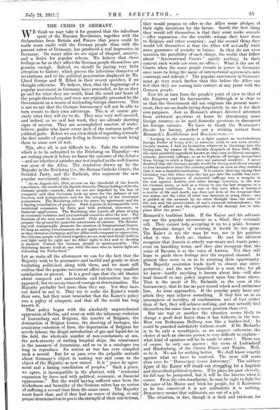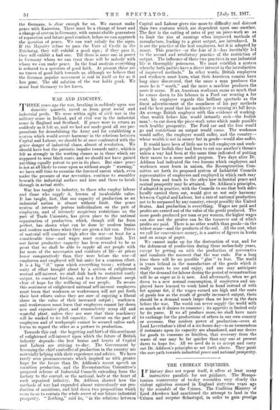THE CRISIS IN GERMANY.
WE think we may take it for granted that the infectious spirit of the Russian Revolution, together with the declarations from Britain and France that peace could be made more easily with the German people than with the present rulers of Germany, has produced a real impression in Germany. On many sides we see signs of disquiet, anxiety, and a desire for popular reform. We believe that these feelings so far as they affect the German people themselves are genuine enough. Indeed, we should be paying very little attention to history, which proves the infectious character of revolutions, and to the political penetration displayed by Mr. Lloyd George and M. Ribot in their recent speeches, if we thought otherwise. We believe, then, that the beginnings of a popular movement in Germany have proceeded, so far as they go and for what they are worth, from the mind and heart of, the 'people themselves, and were not originally procured by the Government as a means of misleading foreign observers. This is not to say that the German bureaucracy will not be able to turn events to their own advantage. This is of course pre- cisely what they will try to do. They may very well succeed, and indeed, as we said last week, they are already showing signs of success. They are accomplished masters of make- believe, guides who know every inch of the tortuous paths of political guile. Before we can even think of regarding seriously the first results of popular feeling in Germany we must bring them to sonic sort of test.
This, after all, is not difficult to do. Take the resolution which is to be submitted to the Reichstag on Thursday—we are writing about it before we know the outcome of the clebat e —and see whether it satisfies any test implied in the well-known war aims of the Allies. The resolution drawn up by the Majority in the Reichstag (i.e., the Roman Catholic Centre, the Socialist Party, and the Radicals, who represent the new popular movement) runs :- " As on August 411,, 1914, so now on the threshold of the fourth war winter, the words of the Speech from the Throne hold good for the German people—namely, that we are not impelled by the lust of conquest, and that Germany took up arms for the defence of her freedom and independence and for the integrity of her territorial possessions. The Reichstag strives for peace by agreement and for
lasting conciliation of peoples. Such a peace is incompatible with territorial expansion by force and with political, economic, or financial oppressions. The Reichstag also rejects all plans aiming at economic isolation and international enmities after tho war. The freedom of the seas must be assured. Only an economic peace will prepare the ground for peaceful intercourse of nations. The Reichs- tag will energetically promote the creation of International Courts. So long as enemy Govertunents do not agree to such a peace, eo long as they threaten Germany and her Allies with conquest or oppression, the German people will stand together as one man and firmly hold on and fight until its right ant! its Allies' right to live and to develop is assured. United the German people is unconquerable. The Reichstag knows itself at one with the men who in heroic fight are defending the Fatherland."
Let us make all the allowances we can for the fact that the Majority wish to be persuasive and tactful and gently to draw hesitating politicians along with them, and we must still confess that the popular movement offers us the very smallest satisfaction at present. It is a good sign that the old bluster about conquest and annexations and indemnities has dis- appeared, but we see no trace of courage or determination. The Majority probably feel more than they say. Yet they have not dared to say it. They try to make the Kaiser's words their own, but they must remember that the Kaiser's policy to a policy of conquest, and that all the world has long known its
That policy began with the absolutely unprecedented oppression of Serbia, and went on with the infamous violation of Luxemburg and Belgium, the murder of Belgians, the destruction of Belgian homes, the shooting of hostages, the avaricious extortion of fines, the deportation of Belgians for servile labour, the illegal introduction of gas and liquid-fire in the field, the wholesale murder of non-combatants at sea, the arch-atrocity of sinking hospital ships, the connivance in the massacre of Armenians, and so on in a catalogue too long to reproduce: No nation at war has ever compiled such a record. But let us pass over the palpable untruth about Germany's object in making war and come to the object of the Majority as now stated. It is " peace by agree- ment and a lasting conciliation of peoples." Such a peace, we agree, is incompatible in the abstract with " territorial expansion by force and with political, economic, or financial oppressions.! But the world having suffered once from the wickedness and brutality of the German rulers has no notion of suffering a second time from the same cause. The Majority must know that, and if they had an ounce of daring, or any Proper determination to prove the strength of their convictions, they would propose to offer to the Allies some pledges of their right intentions for the future. Surely the first thing they would tell themselves is that they must make amends —offer reparation—for the terrible wrongs they have done to Belgium and other countries ; and the second thing they would tell themselves is that the Allies will ritually wait some guarantee of security in future. As they do not even mention the possibility of such things, the words that follow about " International Courts " signify nothing. In their context such words are even an offencs. What is the use of Courts when the same people remain in power in Germany once more to bring the name of international agreements into contempt and ridicule ? The popular movement in Germany must go very much farther than this before the Allies can feel that they are coming into contact at any point with the German people.
Now let us turn from the people's point of view to that of the Emperor and his bureaucrats. Although it is clear to us that the Government did not originate the present move- ment, they are no doubt trying desperately to use it for their own purposes. Just as Bismarck always diverted attention front awkward questions at home by threatening some foreign country, so he used domestic questions to disconcert his foreign enemies. We have to thank the Westminster Gazette for having picked out a striking extract front Bismarck's Recolleetions and Reminiscences :— " Looking to the in necessity in a fight against an overwhelming foreign Power of being a',lr, extretno need, to use even revolu- tionary means, I had no hesitation whatever in throwing into the frying-pan, by means of the circular despatch of Juno 10th, 1866, the most powerful ingredient known at that time to liberty.mongers, namely, universal suffrage, so as to frighten off foreign monarchies from trying to stick a finger into our national omelette. I never doubted that the German people would be strong and clever enough to free themselves from the existing suffrage as soon as they realised that it was a harmful institution. If it cannot, then my saying that Germany can ride when once she has got into the saddle was erro- neous. The acceptance of universal suffrage was a weapon in the war against Austria and other foreign countries, in the war for German unity, as well as a threat to use the last weapons in a war against coalitions. In a war of this sort, when it becomes a matter of life and death, one does not look at the weapons that one seizes, nor the value of what one destroys in using them ; one is guided at the moment by no other thought than the issue of the war and the preservation of one's external independence ; the settling of affairs and the reparation of the damage has to take place after the peace."
Bismarck's tradition holds. If the Kaiser and his advisers can use the popular movement as a blind, they certainly will. They cannot help accepting it up to a point, because the domestic danger of resisting it would ha too great. The Kaiser is not the man ho was, nor is his position what it was. Both are shaken. Ho and his advisers recognize that Austria is utterly war-weary and wants peace, even on humbling terms, and they also recognize that the voice of Bavaria is as the voice of Austria. Yet they still hope to guide these feelings into the required channel. At present they seem to us to be awaiting their opportunity. The Majority resolution lends itself to almost any inter- pretation ; and the new Chancellor is a man who, for all we know—hardly anything is known about him—will also lend himself to any policy imposed upon him front above. That is the merit of Dr. Michaelis in the eyes of the bureaucracy, that he has no past record which need embarrass him. An issue approaches. If the popular party have any pluck, they may achieve something. If they live on in au atmosphere of servility, of condonation, and of tact rather than of fact, they will achieve nothing, and may actually find themselves for some time in a worse position than ever-
But one way or another the situation seems likely to change a good deal faster than was has hitherto in the war. Herr von Bethmann Hollweg was like a feather-bed ; he could be punched indefinitely without result. If Dr. Michaelii is to be only a mouthpiece, as we suspect--otherwise the choice of such an obscure person is very difficult to explain— what kind of opinions will he be made to utter I There can of course be only one answer : the views of Ludendorff and Hindenburg, of the Crown Prince and Tirpitz.. so be it. We ask for nothing better. We shall know exactly against what we have to contend. The issue will more than ever be Democracy versus Autocracy." The solitary figure of the Kaiser will stand out struggling for a hopeless and discredited political system. If he plays his part cleverly, his fall may be postponed, but it will be the heavier when it comes. From his own standpoint, he may be right to fight for the cause of his House and trick his people, for if Kaiserism as he has conceived it is not militaristic it is nothing. Democracy means that militarists are out of a job. The situation, in fine, though it is dark and intricate for
the Germans, is clear enough for us. We cannot make peace with Kaiserism. There must be a change of heart and a change of system in Germany, with unmistakable guarantees of reparation and future good conduct, before we can approach the question of peace. We can wait calmly for the signs. If the Majority refuse to pass the Vote of Credit in the Reichstag, they will exhibit a good sign ; if they pass it, • they will exhibit a bad one. Till there is some one in power in Germany whom we can trust there will he nobody with whom we can make peace. In the final analysis everything is reduced to a question of good faith. At present there are no traces of good faith towards us, although we believe that the German popular movement is real in itself so far as it has gone. The old solution of the war holds good. We must beat Germany to her knees.



























 Previous page
Previous page